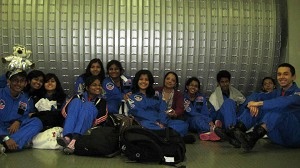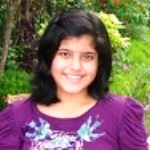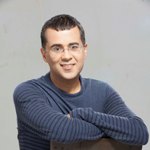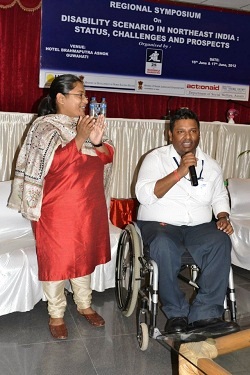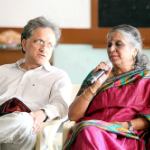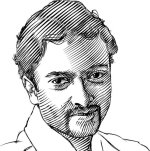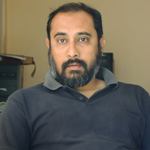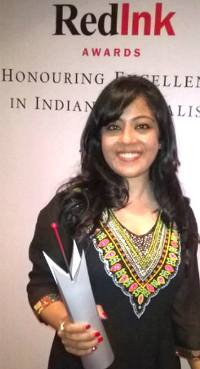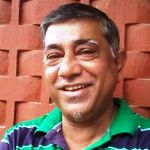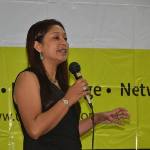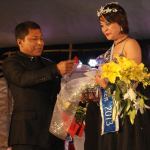Huntsville was fresh with country air.
Space camp itself, however, was a different world.
One of the reasons this trip was so special was because it was the first time I was in the US without my family. We did have supervision, of course (liberalism, especially our parents', often has well-defined boundaries). On my trip, I joined a group of 14 students (12 girls and 2 unfortunate boys who tagged along with us gal-pals) and their teacher -- all from Mumbai.
When I think about our journey to the camp, I remember distinctly the beautiful meadows of green and yellow we passed by as the bus took us from Huntsville airport to the camp premises. It was autumn time and the leaves had just begun to change color. We reached the gate, were buzzed in and as we stood there after unloading the luggage, figures of authority in camp staff uniforms greeted us with a smile. We smiled back automatically and after receiving a few welcoming words, were ushered in.
Before orientation began, we were given bracelet tags that had our names, room number and group IDs on it. My group name was Von Tiesenhausen. I remember pronouncing it all wrong until orientation when we met our night time group leader -- an incredibly lively girl called Jeremy.( Now that I think about it, who's to say her way of pronouncing it was right? American pronunciations of proper nouns are debatable in the least.) We were later shown our rooms -- which consisted of bunk beds, with each room accommodating around six persons. Others at Space Camp included a group of 20 students from a school in Dubai (but the nationalities of the students studying in the school varied from United Kingdom to Afghanistan) and 15 more students from Taipei.
We didn't do much on the first day; they gave us a tour of the premises and we got some time to soak in the atmosphere. The people were friendly and I was already at home with my Mumbai friends (most of who were also assigned to the same group of Von T.) The center itself consisted of a few museums, life-size rockets and space shuttle models, a variety of simulators, an IMAX theater, a 3-D theater, a scuba diving rink, camp residences, mission control rooms, a walk-in space shuttle and the luscious "Area 51" where we would do all our "outdoor" activities. There were, of course, some strict rules to be followed. We all received only 30 minutes for getting ready in the morning as well as for going to bed at night -- and it was the only time we were allowed to use our cell phones to call home.
You might wonder what the objective of Space Camp is. I could ramble on here about the educational opportunities and high-tech appliances of the camp but what good would that do? Here's the entire thing put simply: It's a fantastically mind-boggling experience (which is the Awesome Thing about Space Camp #2). On the second day, we met our day team leader Andrew (who was so nice and friendly that he might as well have been ATASC #3) and were introduced to the main event of the week: our flight missions.
Every flight mission has a commander, a pilot, mission specialists, and tons of other people in the mission control room -- all with indispensable roles to play. We were given transcripts of what we had to do, how the mission had to go and all of us (except the pilot, commander and mission specialists) sat in the control room making sure we didn't have any anomalies. An "anomaly" is simply a fancy word for something going wrong and we always had to keep an eye on the data on the screens in front of us, making sure everything was normal and under control. Every time an anomaly came up, we would all jump and scramble about in the instructions book, trying to find the right way to fix it. Once a solution was discovered, the CAPCOM had to distinctly instruct the Commander (who was sitting on the flight deck of the space shuttle) what to do and if the commander followed the instructions by pressing the right buttons, the anomaly would soon be gone.
Some anomalies were easy -- press a few buttons and you could bid them goodbye. But there were some which required serious thinking to solve. In cases like that, the mission control room would start resembling the sets of a soap opera -- with people screaming and pulling on their hair in frustration (because their mission was about to fail), the flight director buried in books of instructions, always hopeful that some sort of solution would come by at the last minute.
There were four one-hour missions and one six-hour mission. The six-hour mission was the most exhausting/enjoyable of them all because in it the concept of "medical anomalies" was introduced. We would sit in our positions, thinking naively that everything was going oh-so-well when suddenly our group leader would inform us that our flight director had suffered a heart attack and was about to die in five minutes unless we found a way to save him. Funnily enough, our "doctor" was asleep for 4 of those 6 hours (she saved a few people first and then dozed off). We would often burst out laughing at the most inappropriate of times such as when we were supposed to be choking to death. Needless to say, it was the best six hours I had had in a long time.
The only thing in Space Camp that even came close in comparison with the Flight Missions was our trips to Area 51. It was here that we carried out many "team" activities (some with quirky rules and missions to fulfill -- all requiring intense logic, coordination and planning). Some activities were for individuals (like rock climbing). There was a forest which served as a connecting link to the main camp grounds and I remember walking through the woods, over grounds covered with dried autumn leaves, the trees dark with the sunlight shining through. We all got flight suits (ATBSC #4) and were required to wear them for each day's activities.
The third major thing we had in Space Camp was engineering challenges. We had to basically build a rocket out of scrap objects provided to us. On the payload, there would be placed a raw egg and on launch day, our main objective was to make sure the egg survived the launch and that the parachutes attached to the payload deployed safely. It wasn't long before I started hating the engineering challenge. Sure, it sounds fun now, but try making a rocket with scrap objects yourself at home and you?ll agree with me that it's a pretty mean feat- especially when you don't have any idea about what you're supposed to be doing. However, as the days passed by, I did start getting the hang of it and I'm happy to say, the egg was retrieved in the end without any major scratches. Some engineering challenges were strange -- such as when we had to make a spacesuit for an apple (don't ask) or form a heat shield that would keep an egg from boiling over. We also watched several movies at the IMAX Theater, got briefed on space history, went on a number of simulator rides and went scuba diving at the rink. Later, we attended a seminar where astronaut Leland Melvin delivered a funny and inspiring speech about his experiences in outer space.
Graduation Day was unwelcome but somehow managed to sneak up on us. On our last day in Space Camp, we stood in line as we went up to the stage to receive our patches and accolades. The day team leaders gave a speech and we all frantically clicked last-minute group photos. We didn't cry (really, we didn't) but we weren't too happy about leaving either. There was something about this place, something fresh that lived through ages and in the people who worked here I recognized a love for what they taught us. Of course, my group leaders Andrew and Jeremy did a great deal to make me feel that way. And the wonderful experience would not have been the same without the amazing people whom I?m lucky to call my friends. I hope, in my words, I have done some justice to that one week spent in autumn 2011 -- a week spent discovering, learning, and being amazed at how small our world really is and how much more is still out there, waiting.
